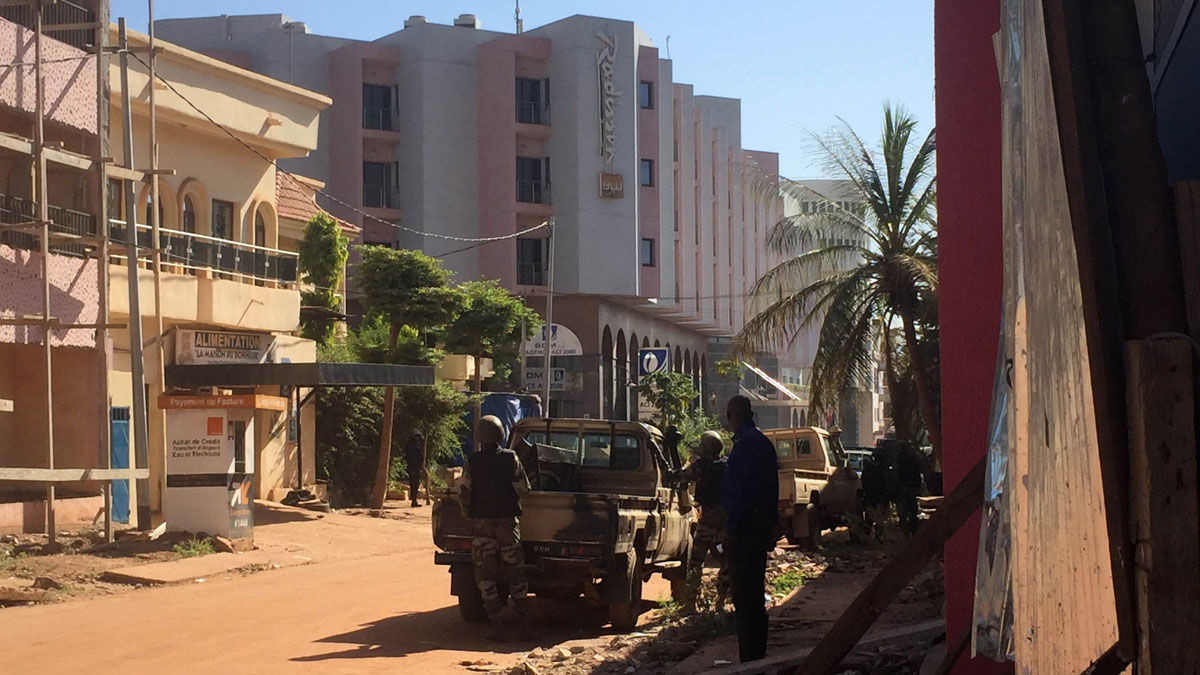Mali attack: troops storm hotel after up to 27 deaths
More than 100 people were taken hostage in the Radisson Blu hotel in the capital Bamako

A free daily email with the biggest news stories of the day – and the best features from TheWeek.com
You are now subscribed
Your newsletter sign-up was successful
Special forces have stormed a hotel in Mali in which gunmen have killed at least three people and are holding more than 100 hostages.
They attacked the US-owned Radisson Blu hotel in the capital Bamako this morning, screaming "God is great" in Arabic as they opened fire. Reports suggest that up to 27 people died in the assault.
The country's security ministry has confirmed that three of the gunmen have been killed by security forces, the BBC reports.
The Week
Escape your echo chamber. Get the facts behind the news, plus analysis from multiple perspectives.

Sign up for The Week's Free Newsletters
From our morning news briefing to a weekly Good News Newsletter, get the best of The Week delivered directly to your inbox.
From our morning news briefing to a weekly Good News Newsletter, get the best of The Week delivered directly to your inbox.
Dozens of people, many of them foreigners, have already been freed. Security sources told Reuters that some gunmen had been freeing hostages who were able to recite verses of the Koran.
US soldiers are assisting the Malian forces in the rescue operation, as are UN peacekeeping troops.
"We have sealed all the exit points of the hotel, so be assured none of the hostage takers will be able to escape," the interior minister told journalists outside the hotel.
It is still unclear how many attackers are involved, with some reports suggesting that up to ten gunmen had been seen. Eyewitnesses say they were masked and arrived in a car with diplomatic number plates.
A free daily email with the biggest news stories of the day – and the best features from TheWeek.com
Some of freed hostages reported hearing the gunmen speaking to each other in English, the Daily Telegraph reports.
"I heard them say in English 'Did you load it?', 'Let's go'," said Sekouba 'Bambino' Diabate, a Guinean singer who was in the hotel when they attacked.
Malian president Ibrahim Boubacar Keita cut short his trip to Chad and President Francois Hollande sent a message of solidarity to the former French colony.
The hotel is in a neighbourhood west of the city centre, among government ministries and embassies, and is popular with aid workers, airline crew an UN officials.
Mali has experienced many terror attacks since Islamic extremists, some with links to al-Qaeda, took control of the north following a military coup in 2012.
A French-led military intervention in 2013 scattered the extremists from towns and cities, but the region remains insecure and there have been attacks in the south.
Earlier this year, five people were killed when masked gunmen attacked a restaurant popular with foreigners in Bamako. More than 1,000 French troops remain in the country.
The UK Foreign Office, which has advised against all travel to Mali for some time, has urged British nationals in the capital "to remain indoors" today.
-
 Political cartoons for February 16
Political cartoons for February 16Cartoons Monday’s political cartoons include President's Day, a valentine from the Epstein files, and more
-
 Regent Hong Kong: a tranquil haven with a prime waterfront spot
Regent Hong Kong: a tranquil haven with a prime waterfront spotThe Week Recommends The trendy hotel recently underwent an extensive two-year revamp
-
 The problem with diagnosing profound autism
The problem with diagnosing profound autismThe Explainer Experts are reconsidering the idea of autism as a spectrum, which could impact diagnoses and policy making for the condition
-
 Epstein files topple law CEO, roil UK government
Epstein files topple law CEO, roil UK governmentSpeed Read Peter Mandelson, Britain’s former ambassador to the US, is caught up in the scandal
-
 Iran and US prepare to meet after skirmishes
Iran and US prepare to meet after skirmishesSpeed Read The incident comes amid heightened tensions in the Middle East
-
 Israel retrieves final hostage’s body from Gaza
Israel retrieves final hostage’s body from GazaSpeed Read The 24-year-old police officer was killed during the initial Hamas attack
-
 China’s Xi targets top general in growing purge
China’s Xi targets top general in growing purgeSpeed Read Zhang Youxia is being investigated over ‘grave violations’ of the law
-
 Panama and Canada are negotiating over a crucial copper mine
Panama and Canada are negotiating over a crucial copper mineIn the Spotlight Panama is set to make a final decision on the mine this summer
-
 Why Greenland’s natural resources are nearly impossible to mine
Why Greenland’s natural resources are nearly impossible to mineThe Explainer The country’s natural landscape makes the task extremely difficult
-
 Iran cuts internet as protests escalate
Iran cuts internet as protests escalateSpeed Reada Government buildings across the country have been set on fire
-
 US nabs ‘shadow’ tanker claimed by Russia
US nabs ‘shadow’ tanker claimed by RussiaSpeed Read The ship was one of two vessels seized by the US military